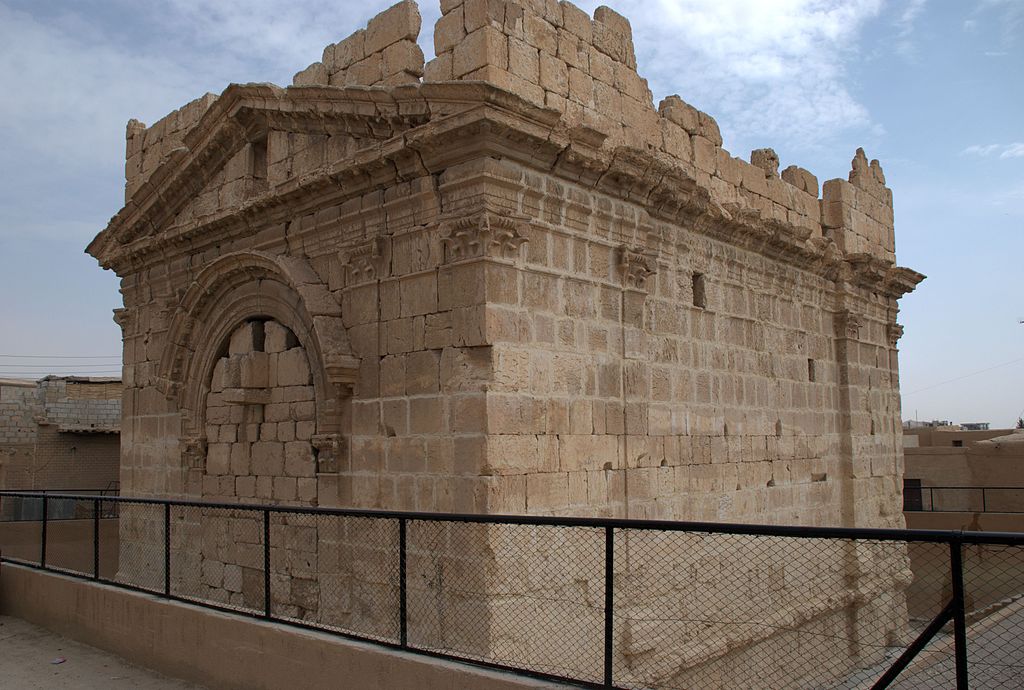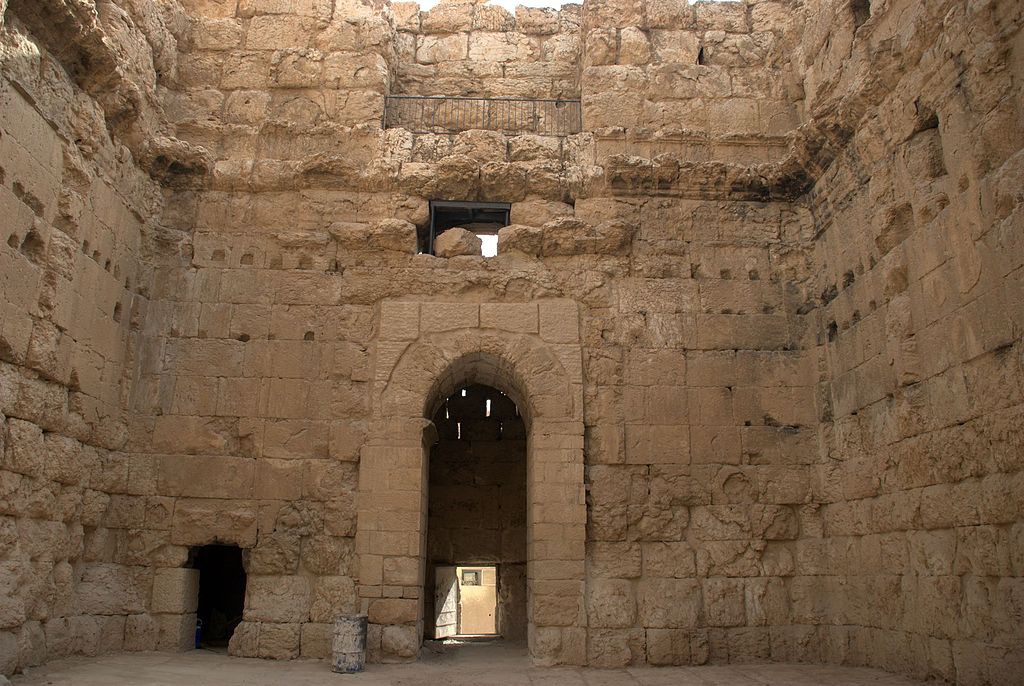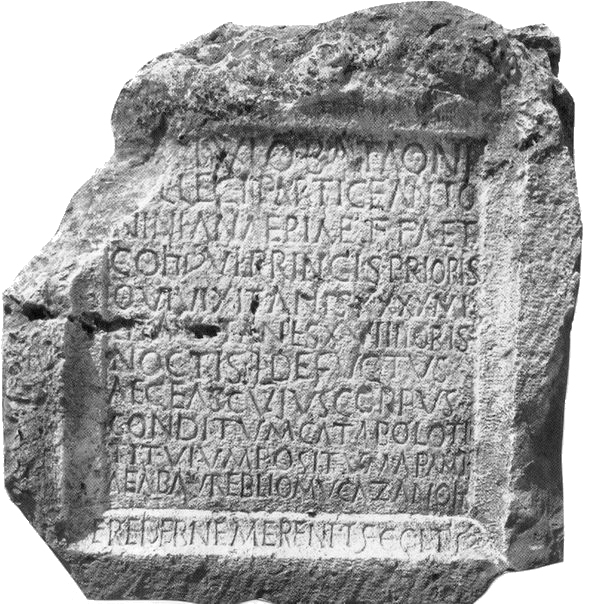Some time after April 4 215 AD, his birthday, Caracalla traveled to Antiochia (Cassius Dio 77,19,3). His stay there was interrupted by a journey to Alexandria. The dating of events and decisions of course remains an issue. For example we do not have a precise date for the jurist Paulus' remark: "The Divine Antoninus made the people of Antioch colonists leaving the tribute untouched" (Divus Antoninus Antiochenses colonos fecit salvis tributis; Digesta 50.15.8.5). From the status of colony can be deduced that the text refers to the sole reign of Caracalla.
Simplified map of Syria.
Sillar 2001, fig. 10.The envoy from Ephesus, which we already encountered a few times, met Caracalla in Antiochia once more. An exceptional discovery was made in Dmeir (also ad-Dumair), some 45 kilometers to the north-east of Damascus. On the wall of a well-preserved Roman building (only the roof has collapsed) are the minutes of a legal hearing (cognitio) by Caracalla. It took place in Antiochia on May 27 216 AD, by which time Caracalla had therefore returned from Egypt. Dmeir was apparently called Goharia. The first lines of the inscription are in Latin, the remainder is in Greek.
Under the consulate of Sabinus and Anulinus, the 6th day before the calends of June, in Antioch, the emperor Caesar M. Aurelius Antoninus Pius Felix Augustus, Parthicus Maximus, Britannicus Maximus, Germanicus Maximus, greeted by the Praetorian Prefects, most eminent men, by his friends and by the Secretaries of State, having sat in his tribunal, summoned Aurelius Carzaeus, son of Sergius, defender of the people of Goharia, acting against Avidius Hadrianus, publican, a case that the emperor had well wanted to receive before him. Aur. Carzaeus with his lawyer Egnatius Lollianus, Avidius Hadrianus, publican, with his lawyer Julianus Aristaenetus.
Among them, Aristaenetus says: "I oppose the admission of the case."
Lollianus (addressing the emperor): "You have ordered that the case should be accepted."
Aristaenetus: "The appeals are made following the legal route: either the governor accepts the appeal and brings it before your tribunal; or else, if the governor does not admit it, how would the case be admissible? After multiple judgments and decisions, you have received a plea among the requests of the people of Goharia. Although he was neither their official representative nor their deputy, but merely a party in a lawsuit, in a personal capacity, he presented a petition in order to have you as judge instead of the governor. [You told him:] If you want me to hear you, I will hear you. [Previously these people] did not even raise an objection; now, while we were proceeding through the regular court route, [they made a request to you; but it must be said] that they are not in appeal and cannot be before [your tribunal]."
Lollianus: "Some peasants who [reached you] with other requests, also presented this plea to you. Cassius did not admit the opposition [established on the fact that previously] they did not complain. He introduced before your divine tribunal [the affair with] the other demands so that [you found yourself to be] a judge ... having ordered that this be read out ..." (gap corresponding to three lines of the text; perhaps the governor was speaking?)
[Antoninus] Augustus: "So you are saying that he did not appeal?"
Aristaenetus: "[They are not] in appeal because they did not have the right to do so."
Antoninus Augustus: "So let's see, let me say a little about my feelings also in this affair: he did not appeal, he did not prosecute (in court?); the matter was not taken to the governor. It is before the Emperor that I am pursuing you, he says. Don't you want me to hear the case?"
Aristaenetus: "That is correct."
Antoninus Augustus: "Me, if I was in a hurry to get up from here, I would say: the opposition is well founded. So what am I to blame for (?) ?"
Lollianus: "I will speak for less than half an hour", and he added: "The lawsuit is about a question of piety; for the peasants as for you, there is nothing more venerable than piety. This is why they have confidence in the present circumstance, since they plead before the emperor and the most pious judge. There is a famous sanctuary of Zeus among them. For sure it is visited by all the people from the vicinity. They go there and send processions there. Here is the first offense of our adversary [...] he enjoys immunity from public duties and, wearing a golden crown, he enjoys [...] and he took in hand a scepter and proclaimed himself priest of Zeus. How was he deemed worthy of this privilege? Let him show it. Because I in his presence (?), I will read (a piece showing) that not even his father [...]."Inscription from a temple in Dmeir.
Translation after the French translation by Pierre Roussel and Fernand De Visscher, 1943.Two further Greek inscriptions of the building record the original dedication, perhaps in 148 AD, and the completion and final dedication during the reign of Philippus Arabs (October 15 245 AD). The building may have been a porticus at first, to be changed into a temple later on. Yet another, fragmentary Greek inscription - again minutes of a legal meeting - identifies the building as a temple of Zeus Hypsistos, "the most high Zeus".
Plan of the Temple of Dmeir. Bruemmer 1985, Abb. 1.


Temple of Dmeir, exterior and interior looking towards the east.
Photos: Wikimedia, Bertramz.Of great interest is also a Greek inscription found in Apamea, perhaps from late 215 AD. It refers to the city as the 203rd stopping-place (in Latin this would be mansio), counting from Rome.
For the prosperity and the victory of our lord Marcus Aurelius Antoninus,
Pious, Happy, invincible Augustus, for those of the sacred armies, of the sacred Senate and
of the Roman people, the senate and the people of Claudia Apamea, city of Antoninus,
who in this city inaugurates [this building (?) or his expedition (?)], from his 203rd haltingplace.The inscription from Apamea.
Translation after the French translation by René Mouterde, 1952.Part of the route of Caracalla's army can be read in a funerary inscription from Apamea. It tells the story of Vivius Batao, soldier of the Legio II Parthica Antoniniana. He had served for 18 years and died at the age of 40, in the second hour of the night, in Aegeae in south-eastern Turkey. The troops then continued eastward to Catabolum, where he was buried. Their next stop was Apamea, where the inscription was set up by his heir, Aurelius Mucazanus.

[---]IVIO BATAONI
MIL(iti) LEG(ionis) II PART(h)IC(a)E ANTO
NINIANAE PIAE F(idelis) F(elicis) AET(ernae)
COH(ortis) VI PRINC(ip)IS PRIORIS
QVI VIXIT AN(n)IS XXXX MI
LITAVIT AN(n)ES XVIII (h)ORIS
NOCTIS II DEFV(n)CTVS
AEGEAS CVIVS CORPVS
CONDITVM CATABOLO
TITVLVM POSITVM APAM(e)AE
AB AVRELIO MVCAZANO H
EREDE B(e)NE MERENTI FECITFunerary inscription from Apamea.
EDCS-03700739. Photo: EDCS.Milstones document repairs of roads and bridges in the area, especially towards the south, in Syria Palaestina.
Milestone from 212 AD in Scythopolis (Beit She'an, Israel): vias et pontes restituit.
EDCS-10701936. Photo: Wikimedia, Avishai Teicher.